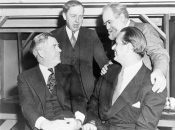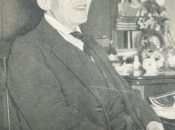Isaac Newton’s life was defined by profound intellectual achievements and a thirst for understanding the fundamental workings of the universe. Born in 1643 in Woolsthorpe, England, Newton’s early years were marked by personal challenges, including the loss of his father before his birth. Raised by his mother and maternal grandmother, he demonstrated exceptional academic promise, leading to his enrollment at Trinity College, Cambridge, where he delved into mathematics and natural philosophy.
Newton’s groundbreaking work on calculus, optics, and mechanics laid the groundwork for his reputation as one of history’s most influential scientists. His publication of “Philosophiæ Naturalis Principia Mathematica” in 1687, presenting the laws of motion and the law of universal gravitation, reshaped scientific thinking and established the foundations of classical mechanics.
Apart from his scientific pursuits, Newton served as a government official, holding positions such as the Master of the Royal Mint, where he played a crucial role in reforming Britain’s currency. His meticulous approach to both science and administrative duties showcased his discipline and dedication to excellence.
Newton’s life was also characterized by occasional controversies and disputes with contemporaries, including a famous feud with mathematician Gottfried Leibniz over the invention of calculus. Despite such clashes, Newton’s intellectual legacy remained unparalleled, garnering him widespread recognition and accolades, including being knighted by Queen Anne in 1705.
He spent his later years as the president of the Royal Society, contributing to various scientific discussions and continuing his research until his death in 1727. Newton’s legacy endures as a beacon of scientific inquiry, revolutionizing our understanding of the natural world and leaving an indelible mark on the realms of physics, mathematics, and astronomy.

Books by Isaac Newton
Here are 19 interesting facts about Isaac Newton’s life to know more about him.
- Premature Birth: Isaac Newton was born on December 25, 1642, in Woolsthorpe, Lincolnshire, England, prematurely and frail.
- Father’s Death: His father died before his birth, and Newton was raised by his mother, Hannah Ayscough Newton, after his stepfather passed away.
- Academic Excellence: Newton showed remarkable academic promise early on, eventually gaining admission to Trinity College, Cambridge, at the age of 18.
- Mathematical Insights: During the Great Plague of London in 1665-1666, Newton retreated to his hometown, where he made significant discoveries in calculus, optics, and the laws of motion.
- Laws of Motion: His work on the laws of motion, formulated in “Philosophiæ Naturalis Principia Mathematica,” revolutionized physics and mechanics.
- Optics Investigations: Newton conducted experiments with prisms, leading to his groundbreaking work on the nature of light and the discovery of the color spectrum.
- Lucasian Professorship: Newton became Lucasian Professor of Mathematics at Cambridge in 1669, a position later held by other scientific luminaries such as Stephen Hawking.
- Newton’s Apple: The story of Newton discovering gravity with an apple falling from a tree, while possibly exaggerated, remains a popular anecdote about his scientific inquiry.
- Royal Society: He became a fellow of the Royal Society in 1672 and later served as its president, contributing significantly to scientific discussions and advancements.
- Feuds and Rivalries: Newton had disputes with several contemporaries, notably his bitter rivalry with Gottfried Leibniz over the invention of calculus.
- Mint Director: Newton was appointed Master of the Royal Mint in 1696, where he played a pivotal role in reforming Britain’s currency.
- Alchemical Interests: Newton had a profound interest in alchemy, dedicating a significant amount of time to alchemical experiments, despite it being outside mainstream science.
- Book Burning: Newton reportedly destroyed some of his own writings, particularly those related to his studies in alchemy.
- Unpublished Works: A considerable portion of Newton’s writings on theology and alchemy remained unpublished during his lifetime.
- Practical Inventor: Newton developed a reflecting telescope and contributed to the design of mechanical clocks, aiding advancements in astronomy and timekeeping.
- Knighted: He was knighted by Queen Anne in 1705 in recognition of his contributions to science and academia.
- Introverted Nature: Newton was known for his reclusive nature and tendency to withdraw from social interactions for prolonged periods.
- Contributions to Mathematics: His work in calculus and mathematical analysis laid the groundwork for modern mathematics.
- Death and Legacy: Isaac Newton passed away on March 31, 1727, in Kensington, London, leaving behind an enduring legacy as one of history’s most influential scientists.
Isaac Newton’s life stands as a testament to the power of intellect, perseverance, and the pursuit of knowledge. Born into humble beginnings, he defied odds, unraveling the mysteries of the natural world and reshaping our understanding of the universe. His profound insights into mathematics, optics, and physics laid the cornerstone for modern science, while his disciplined pursuit of truth and precision set an enduring standard for scientific inquiry. Newton’s life was a tapestry of groundbreaking discoveries, administrative acumen, and occasional controversies, leaving an indelible mark on humanity’s intellectual landscape. His legacy, an emblem of unparalleled genius and unwavering dedication to inquiry, continues to inspire scientists, scholars, and seekers of knowledge across generations.





